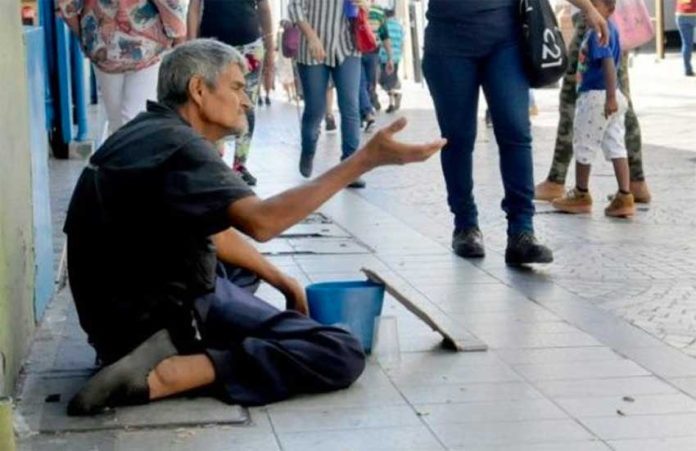When I was living in Querétaro I once saw what I am sure was a foreign 20-something woman walk over to an older lady covered in a shawl who was always stationed in the middle of a busy, touristy walkway, hand cupped and outstretched to passersby who’d rush on, trying not to make eye contact.
She carried over a gallon of water and some plastic cups and sat down next to her on her piece of cardboard. The old woman looked up and smiled at her — I think it was the first time I’d ever seen her face — and I immediately felt shock and shame that it had never occurred to me to do the same.
In Xalapa, where I live, the same woman has been sitting outside the downtown Sears with a plastic cup for the coins of sympathetic commuters, usually with a dust-covered child or two under the age of six in her company.
It’s been 18 years since I first saw her, and we’ve aged together in this same city, in our different worlds.
A couple of years ago I was walking home, headphone in, but wasn’t in any particular hurry. I passed an old woman who was crying alone on a bench. I thought of stopping to comfort her and ask what was wrong, but my worry that I might feel compelled to help her and see it through to the end when her problems were most likely insurmountable stopped me, and I kept walking. I’m not proud of that moment, either.
In my city, there are beggars. In every city there are beggars. And in every city, every person has an opinion about them. The level of derision, in my unscientific, anecdotal experience, tends to correlate to one’s socioeconomic status, with those who are (precariously) middle class but feel that they’re just getting by handing out the most scorn.
I’ve always been resistant to criticize anyone asking for help on the street, not least because I’ve had the experience of watching people close to me sink to the point of (nearly) no return.
When you’re poor, problems are magnified and can rapidly snowball, and what is a small inconvenience for someone with even modest resources can become an insurmountable mountain when you’re already trying to make your last few pesos stretch.
With good jobs scarce and a minimum wage (depending on the region, it’s a range of 102 pesos — about US $5 — and 176 pesos — about $8.70 — a day), it’s not shocking to me that anyone would decide to try their luck asking for more money than they can make at a “regular” job, especially if they lack the education and social capital to land any kind of decent-paying position.
Desperation and the need to feed one’s family, I think, trump the absolute humiliation of receiving the dirty looks and other indignities of asking for the help of strangers.
“All they do is stretch their hands out! Why don’t they get a job? Why should I support someone that doesn’t want to work? I’d love to just sit around all day and have people give me money!”
This is always said with exaggeration, as if desperate people risking kidnapping, death and all manner of trauma and abuses were entitled vacationers.
But here’s the thing: if it’s possible for people to earn more money simply through donations on the street than working at (or even getting in the first place) a minimum-wage job, what really is the scandal here?
We complain about so-called ninis (ni trabajan ni estudian — “they don’t work, they don’t study”), but it’s no surprise that young people would see those with hard-earned college degrees being offered 4,000 pesos a month and conclude the effort is hardly worth it.
Dirty people with pleading eyes and ragged clothes that make you feel guilty for your state of non-misery are much easier targets of our own angst than the minority of already-wealthy, good-looking people that are quite literally bleeding the country dry through graft and corruption.
And besides, it’s hard to be angry at people whom you can’t immediately and easily identify as scoundrels. (To be safe, just assume all rich people are criminals. Kidding! Do you see, though? Did you feel immediately defensive at the prospect of being judged without being known?)
What do we owe each other? To what extent is “self-care” and emotional/physical insulation simply selfish, and when does it mean helping others, who in the end, are just us in different circumstances? We are ashamed to see people in these horrible conditions, and the discomfort of it makes us rush by to quickly forget.
I don’t have the solution, but I don’t think it’s to angrily gripe about them, or worse, directly to them, about hard work and responsibility. Spare a smile, some eye contact, maybe some conversation if you feel safe.
If you have some money, give it; if you can buy someone some food or water, do it. So what if they’re taking advantage of you? Cosmically (and you can trust me on this), they’re not.
Sarah DeVries writes from her home in Xalapa, Veracruz.
